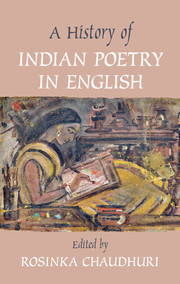Book contents
- Frontmatter
- Contents
- Contributors
- Acknowledgments
- Introduction
- SECTION I THE BROAD NINETEENTH CENTURY: INDIANS IN ENGLISH AND THE ENGLISH IN INDIA
- SECTION II PUBLISHERS, PUBLISHING HOUSES, AND THE PERIODICAL PRESS
- SECTION III POETRY: 1950–2000
- SECTION IV POETS OF THE DIASPORA
- SECTION V THE NEW MILLENNIUM POETS ON THEMSELVES
- 26 From the Language Question to the Question of Language: Three Recent Books of Indian Poetry in English
- 27 Our Speaking English Voice: A Voice That Speaks for Us?
- Bibliography
- Index
27 - Our Speaking English Voice: A Voice That Speaks for Us?
from SECTION V - THE NEW MILLENNIUM POETS ON THEMSELVES
Published online by Cambridge University Press: 05 March 2016
- Frontmatter
- Contents
- Contributors
- Acknowledgments
- Introduction
- SECTION I THE BROAD NINETEENTH CENTURY: INDIANS IN ENGLISH AND THE ENGLISH IN INDIA
- SECTION II PUBLISHERS, PUBLISHING HOUSES, AND THE PERIODICAL PRESS
- SECTION III POETRY: 1950–2000
- SECTION IV POETS OF THE DIASPORA
- SECTION V THE NEW MILLENNIUM POETS ON THEMSELVES
- 26 From the Language Question to the Question of Language: Three Recent Books of Indian Poetry in English
- 27 Our Speaking English Voice: A Voice That Speaks for Us?
- Bibliography
- Index
Summary
I write in English, but I did not come face to face with an Indian poem in English until, in college, at seventeen, I read Nissim Ezekiel's “Night of the Scorpion.” Ezekiel, whose first collection of poems, A Time to Change, was published in 1952, is considered the post-Independence progenitor of the genre. All English poetry previous to that – and it began to be written in the early nineteenth century – has generally been considered archaic, sentimental, and vaguely spiritual. Given my teenage understanding of poetry as generally dealing with “old, unhappy, far-off things” rather than some “familiar matter of today,” I found Ezekiel's voice in “The Night of the Scorpion” too close at hand as well as unsettlingly direct, nonchalant even. “I remember the night my mother/ was stung by a scorpion. Ten hours/ of steady rain had driven him/ to crawl beneath a sack of rice.” The poem ended in an equally familiar manner: “My mother only said:/ Thank God the scorpion picked on me/ and spared my children.” This is exactly the sort of doting thing one could expect one's own mother to say. I remember feeling for this poem, when I first read it, something approaching distaste. The poem was prosaic; it lacked the expansiveness, the rhythm, the capacity to elevate that I had come to expect from poetry.
I had forgotten my initial response to Ezekiel until many years later I came across these lines from Amit Chaudhuri's introduction to the Picador Book of Modern Indian Literature. He's talking about how some Indian poets created a modern vocabulary not through a demonstrative English or post-colonial gestures of appropriating the language, but simply by using it in an everyday way:
The peculiar excitement of the poetry that Ramanujan, AK Mehrotra or Dom Moraes … wrote in the 1960s and 70s derived not so much from their, to use Rushdie's word, “chutnification” of the language, but, in part, from the way they used ordinary English words like “door”, “window”, “bus”, “ doctor”, “dentist”, “station”, to suggest a way of life. This was, and continues to be, more challenging than it may first appear; as a young reader, I remember being slightly repelled by the India of post offices and railway compartments I found in these poems; for I didn't think the India I lived in a fit subject for poetry.
- Type
- Chapter
- Information
- A History of Indian Poetry in English , pp. 423 - 437Publisher: Cambridge University PressPrint publication year: 2016



